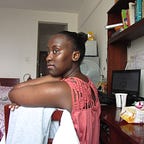Why writing is like baking a cake
Few things got me excited as a child as eating cake. Growing up in Uganda in the early nineties as the country resumed commerce since the overhaul of the Obote regime, my taste for cake was nothing less than a luxury. Along with sodas, cake was the mark of modernity, advance; yet opportunities rarely arose for us to enjoy it.
When my parents would splash out on birthdays; this really meant buying an impeccably frosted cake with hard icing from hot loaf, the only bakery around at the time. When they attended weddings, our hopes were that they would remember to fold pieces of fruit cake in paper cloths and bring them back to us to savor. They usually did. I loved cake so much I deemed anyone who was able to bake in deep admiration. I still do.
Much, much later -if you believe it- my interests expanded; I developed a deep admiration for writers. It started with the story “Children on their birthdays”. I was seventeen, a sixth-form English class had done what years of education hadn’t in convincing me was fun, it got me to read. My lecturer was a silver- haired English man and even before we started reading Truman Capote he spoke about his writing like I imagine myself going on about cake — with passion.
I recall the opening sentence “Yesterday afternoon the six-o’clock bus ran over Miss Bobbit. I’m not sure what there is to say about it; after all, she was only ten years old, still I know no one of us in this town will forget her.” Here lay all I needed to read forever. My lecturer (I forget his name) assigned us passages from the story to take in turns. When my turn to read arrived — of which I eagerly waited — never had I felt so responsible to read something. I did it carefully as the sounds came so beautiful out of my mouth. The imagery demanded all my senses while the story unraveled before my minds’ eye. I’m still in awe; I can’t thank enough my English teacher for introducing me to the likes of authors like Mr Capote.
But it didn’t stop there, as part of the curriculum we were expected to write. How on earth could I write like that. Sure, I had attempted poetry in high school and written essays as part of class assignments but this was like attempting magic. The best way I can describe this process was like a few years ago when I decided to learn how to bake cakes. It was a disaster; each experience had its own story of failure: the dough would not rise, if it rose it was uneven, it was too sweet it would cause headaches, it was under-cooked, it was too eggy, it was like a dry dish sponge, it was wet, it was not a cake at all but actually an alien food form.
Many times, these experiences left me ripe to give up. I reasoned that it wouldn’t be bad just being an admirer; simply eat my cake and not make it. However, each time I read something wonderful like Haruki Murakami’s Norwegian Wood, being brought alive in those words filled me with hope that I can do the same. After all, stories would swirl around my head like distinct flavors, what was it but put it down on paper?
When you start out baking a cake all you can hope for is two things: it will be edible and tasteful. It’s the same with story-telling. All your ingredients are splayed out before you: love — it is to stories what vanilla is to baking — you have your character’s dilemma, their ambition or lack of, you have context and constellations of plot. The blank page carries your mix of words, sentences, you hope will be comprehensible, but mostly full of essence.
In 2017, I baked the most wonderful cake, if you were there you would agree. To celebrate my younger brother’s birthday, I had envisioned the softest chocolate, covered in caramel — cake. Yet hours before the party I pulled out of the oven, molten goo.* I panicked and pondered whether I could pass it off as a souffle. But determined not to give up on my dream cake, I flipped the thing into foil and sent it back into the oven, sealed shut believing enough heat would cook it through and through.
We arrived last among the small group of friends. Even after decades of national peace, it wasn’t odd that cake was still the main part of the show. A friend of his later said she’d dreamt of the cake that night. I couldn’t believe I was responsible for making something that brought forth dreams. If that’s not what stories are made of, I don’t know…
People often speak of the science of cooking; conditions and characteristics that make the ingredients work when they are put together. For me these have been perceived through multiple failures. Baking requires heat and raising agent, writing, imagination and good grammar. Both demand patience and non-stop learning.
For these reasons I’m glad I’ve embarked on the edx course on English Grammar and Style. I’m learning why prose works, and its absolutely fascinating. I once heard someone say that when you love something, it shows because you go out of your way to learn everything there is about it. This continues to ring true for me. I’m glad there is an infinity of learn about life.
End
*These were the days I believed I could bake and deliver a cake on the same day. Yet, the birthday cake being straight out of the oven added to the experience of eating warm chocolatey goodness. Thankfully, I never write anything perfectly in one go, much more realistic there.
